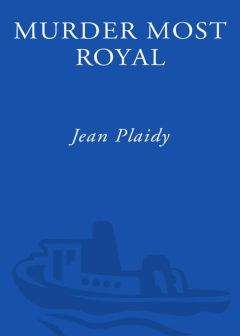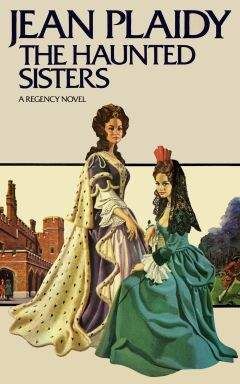Jean Plaidy - For a Queens Love: The Stories of the Royal Wives of Philip II
На электронном книжном портале my-library.info можно читать бесплатно книги онлайн без регистрации, в том числе Jean Plaidy - For a Queens Love: The Stories of the Royal Wives of Philip II. Жанр: Прочее издательство неизвестно, год 2004. В онлайн доступе вы получите полную версию книги с кратким содержанием для ознакомления, сможете читать аннотацию к книге (предисловие), увидеть рецензии тех, кто произведение уже прочитал и их экспертное мнение о прочитанном.
Кроме того, в библиотеке онлайн my-library.info вы найдете много новинок, которые заслуживают вашего внимания.

Jean Plaidy - For a Queens Love: The Stories of the Royal Wives of Philip II краткое содержание
For a Queens Love: The Stories of the Royal Wives of Philip II читать онлайн бесплатно
“Nay, Carlos. It is not that. We are good Catholics. But she is my dear kinswoman and I cannot bear to think of them torturing her. It makes me so unhappy. Perhaps I am a bad Catholic, but when I see strangers hurt I become desperately unhappy, and I would rather die myself than see my aunt taken. I would risk God’s displeasure if need be.”
“We will defy them all, Isabella.”
“Carlos, you have the horses. Will you help me to get a message to her?”
“At once. Oh, Isabella, thank you … thank you for making me so happy. We will send two riders and each shall take a different route. I would I could go myself … Then you would see what I would do for you.”
“I see it now, Carlos.”
“I can send riders whom none will miss. I … I … You see …” He began to laugh suddenly and wildly.
“Carlos,” she begged, “do not laugh like that. You will spoil everything. Be calm and clever as you have been.”
He was silent at once. “I will be calm and clever. And I will be happy because in this we are together … you and I, Isabella … against Philip.”
She shivered, and, gripping her arms, he looked up into her face and cried: “I am happy … happy … happy, Isabella. I am happy tonight.”
He looked sane now, and almost handsome. She wanted to weep, not only for his madness, but for that other madness which made men delight in torturing each other.
FOUR
The memory of the part she played in saving Jeanne from the Inquisition never left Isabella. It was one of the most momentous things she had ever done, and marked a turning point in her life.
Philip never discovered the part she had played in foiling his plans. He knew that Jeanne had been warned of his intentions in time to enable her to escape, with her son, out of Navarre into the heart of France and safety. Isabella often wondered what his reactions would have been to her deception. There were times when she felt a little remorse, but she only had to recall the cruelty of the auto-da-fé to justify her actions; and she never doubted for a moment that if she were presented with a similar situation she would meet it in the same way.
Her feelings toward Philip had necessarily changed. How could she love a man who had been ready to send a noble woman like Jeanne—or any person, man or woman for that matter—to the flames? It was merely because Jeanne, a woman whom she had known and loved, was involved that this had been brought home to her. Even in his tenderest moments she would think: If I became a heretic, he would condemn me to the flames.
If that was piety she preferred human frailty.
He cares more for his soul than anything on Earth—his soul. He thinks he is doing his duty in a manner which will please God and win him eternal bliss. Is that noble? Is that selfless? Is it according to Christ?
She wished she could be young and frivolous again. She wished—more than ever since she had betrayed him—that she could give him a son. It seemed that was not to be. There had been another pregnancy which had ended in failure.
She sought to please him as much as she could. She would not spare herself. She made the long and arduous journey to Bayonne, as his deputy, with the Duke of Alba, that she might meet her mother and her brother Charles, who was now King of France, for a conference on the borders of France and Spain.
What joy it was to see young Charles again, yet how sadly he reminded her of Carlos, with his hysteria and his moods of strangeness. He was still devoted to her and so happy in their reunion.
When she met her mother, she knew how she had grown up, for Catherine no longer had the power to disturb her. Truly she had escaped from Catherine; one day she would escape from Philip.
Catherine showed her awareness of that escape, saying: “You have become a Spaniard!” There was bitter disappointment in her words; she knew well enough that her eldest daughter was no longer her thrall.
I am no more Spaniard than French, thought the young Queen: I am myself.
However, she followed Philip’s instructions in trying to persuade her mother to adopt a more Catholic policy in France; but she knew that Philip meant her inclusion in the mission to be merely a sign of his love for her, and to give her the pleasure of seeing her family. It was Alba and Catherine who paced the long galleries in endless converse, and discussed the future policies of France and Spain.
After she returned to Spain she became pregnant once more, and this time her child lived. Alas!, it was a daughter, and she named her Isabel Clara Eugenie. This child delighted her, but she was not released from the responsibility of giving Philip a son.
How tender was Philip at that time, superintending arrangements himself, making sure that everything should be done for the sake of his little Queen, seeming mutely to plead with her to give him that love which he needed from her and which she could not give! What could he do to please her? That was what he seemed to ask. And how could she answer: By not being Philip; by being just the kind and tender person you are to me without that grim shadow who is always beside you— Philip the fanatic, Philip the murderer of men and women, Philip the man who would have tortured Jeanne of Navarre and sat in the royal gallery with Queen Isabella beside him while that noble body was burned at the stake. How could she say that to him? And if she did, how could he change? He was Philip, the man his father, his Spanish upbringing, and life itself had made him.
Carlos was restive. He was a man now, and he considered it was ridiculous of his father to treat him as though he were a boy—and he the Prince of Spain.
His conduct became more riotous. If Isabella had been allowed to visit him more frequently he would have been quieter. But his father prevented those visits. Isabella herself would have come. Had she not come to him when she needed help? He wanted to shout that through the streets of Valladolid and Madrid. But he must not. It was a secret between them.
Many thoughts chased each other confusedly through his troubled mind.
Together they had saved the heretic Jeanne of Navarre. That pleased him, and because of it he would always have a fondness for heretics. He wanted to be a soldier like Alba, winning victories, and with all the people welcoming him when he returned from the wars. In his dreams he rode at the head of a cavalcade, and everyone was shouting for the conquering hero, Don Carlos, instead of the Duke of Alba.
He wanted to be a statesman like Ruy Gomez da Silva, bland and wise, always calm. He wanted to be King, but not like Philip—quiet, morose, who did not know how to enjoy himself. It was time such as he were out of the way.
In his saner moments he liked to know what was happening in the dominions to which he was heir. Since the trouble in the Netherlands, Philip had talked of going there himself to subdue his unruly subjects.
“I wish I could go!” cried Carlos. “I understand heretics.”
Now he began to talk of heretics with some affection. Why, he demanded, should they not be allowed to have their own thoughts? Why could they not have their own way of worshipping God? Why not? Why not? Carlos would scream at his attendants. Why could they not answer? Why not indeed? Should they disagree with Don Carlos and face his unaccountable wrath, or alternatively run the risk of incurring the displeasure of the dread Inquisition?
Carlos knew what he wanted now. He wanted to go to the Netherlands. He wanted to be the Governor. He shouted his desire to all who cared to listen. He spoke continually of his sympathy with the people of the Netherlands, and at length a deputation came from that country asking that the Prince should be the new Governor.
Philip was exasperated. He visited his son.
“You cannot go to the Netherlands,” he said coldly. “You do not know how to conduct yourself here. How could you hope to govern others when you cannot control yourself?”
Carlos’s fury broke loose. He screamed his defiance. Then suddenly he stopped and, remembering how he and Isabella had outwitted this man, a slow smile touched his lips.
He spoke clearly and coherently. “You hate me, do you not? You know that I wish to go to the Netherlands and that the Flemings wish to have me there; but you refuse my request and theirs. You do this because you hate me. You frustrate me, and I know why. It is because of Isabella.”
“You talk nonsense,” said Philip.
“Do I? Do I, your gracious Majesty!” He laughed. He was thinking of her standing before him, appealing to him so beautifully. “Carlos … you are the only one I can trust to help me …” And together they had worked against this Philip. They had saved the life of the Queen of Navarre … he and Isabella. Small wonder that he loved all heretics. The Queen of Navarre was a heretic, and she had brought him close to Isabella … and Isabella loved him. She had come to him that they might work together against Philip.
He spoke quietly then, as though to himself: “She was mine, and you took her from me, but do not think it will always be thus. You are old … and she is young … and I am young, and I shall always be between you … because she is mine … mine …”
Philip turned abruptly and left him. His son was quite mad, but what an unhealthy situation was this! Carlos and … Isabella! It made him shudder. Carlos did not see himself as others saw him.
Yet Philip was deeply disturbed. He knew that Isabella did not really love him as he wished to be loved. He was fully aware of the restraint between them. He wanted the love of Isabella—the complete love of Isabella—more than he had ever wanted anything in his life.
Carlos … between them! That was ridiculous! But it was a disturbing thought.
After that visit from his father, Carlos’s fury broke out more wildly than ever. He began to seek opportunities of offending the most important men.
The Inquisitor-General, Cardinal Espinosa, had banished an actor from Madrid. Carlos discovered this and, because he was beginning to hate all men in authority, he declared that the banished man was his favorite actor, and he wanted to know what right a priest had to oppose the son of the King. At the very first opportunity he sought out the Cardinal and, in the presence of the officials of the church and the court, he taxed him with deliberately seeking to oppose and annoy the Prince.
The Cardinal defended himself in as dignified a manner as possible, but Carlos was out for revenge and blood. He drew his sword, shouting: “Miserable priest who dares oppose a prince! Miserable torturer of heretics!”
None dared strike the Prince, but it was essential to save the Cardinal, and his friends, ranging themselves about him, hustled him from the room, leaving Carlos foaming at the lips, waving his sword and flashing his wild eyes menacingly at those who remained. Garcia Osorio was fortunately present and managed to soothe him.
But the great Cardinal Espinosa could not allow such an attack on his dignity as well as his person to pass without protest. He presented himself to Philip.
Philip was full of remorse and, as was so often the case when his subjects brought complaints of his son, the interview ended with the Cardinal’s kneeling before the King and swearing to endure even the insults of the Prince for the sake of Philip.
One night Carlos tried to throw one of his servants out of a window because he did not obey his summons quickly enough. On another occasion when riding he pursued Don Garcia de Toledo, the brother of the great Duke of Alba, with his riding whip. Don Garcia had no alternative but to fly before him for fear that he might be forced into an affray in which the Prince might suffer.
It was becoming increasingly clear that Carlos was now nothing less that a violent madman.
Isabella was again pregnant, and Philip therefore decided that he would not go in person to the Netherlands. There was one whom he could trust and whom his Council agreed would be the very man to put down revolt in that troublesome country—a man of ruthless methods, of great personal courage, a fervent Catholic—the great Duke of Alba himself.
When the news of the Duke’s appointment was brought to Carlos he fell into a mood of melancholy and would eat nothing for three days. He was growing very thin through lack of food, and when his frenzies were on him they would exhaust him.
He would lie in his bed and refuse to see anyone, and as he lay there he would talk to himself of death and hate, blood and murder.
Alba, ready to leave for the Netherlands, had occasion to visit the Prince, and when he saw him Carlos completely lost control.
He came out of his silent melancholy and shouted: “Who are you who dares to come here and mock me? How dare you take the governorship of the Netherlands when you know that it belongs to me?”
Alba, seeing the condition of the Prince, sought to placate him. “Your Highness is too precious to his Majesty to be exposed to the dangers of the Netherlands.”
“Do you suggest that I am a coward, sir?”
“Indeed not, your Highness. We know you long to go and fight Spain’s battles. It is solely …”
“You know that, and you consent to go in my place! You take from me that which is mine?”
“Your Highness, as heir to the throne …”
“Ah! Remember it, villain!” Carlos, laughing horribly, showed Alba the dagger he had been hiding in his sleeve. “This is for you, sir. This is for you, Lord Duke. We will send the corpse of a noble Duke to the Netherlands … that we will!”
Carlos’s maniacal laughter rang out as he lunged at the Duke; but Alba was ready; he caught Carlos’s arm and twisted it so that the dagger fell to the ground.
Carlos, impotent to continue his attack, screamed, and attendants came running in.
“Take this man. Set him in irons. Bring me a sword and I will pierce him to the heart. I will kill him … kill him …”
He glared at the cold face of the Duke, and he hated him in that moment almost as much as he hated his father.
Alba said contemptuously: “Take him. Give him some soothing medicine. His Highness is very excited this day.”
Then, almost throwing the Prince into the arms of his attendants, he strode from the apartment.
Isabella was aware of the rapidly increasing tension between father and son.
She longed to comfort Carlos, but she was again pregnant, and each successive pregnancy left her less able to contend with the next.
She was praying urgently for a son.
Ruy, whom she looked upon as one of her greatest friends, knew of her anxiety. She was aware that he shared it. He, more than anyone, seemed to fear the growing menace of Carlos.
Once he said to her: “If your Majesty should have a son, he would be the heir to the throne.”
“And Carlos?” she asked.
“The Council has agreed that in such circumstances Carlos would be declared unfit.”
“Poor Carlos. He would never forgive me.”
Ruy answered: “Carlos would forgive your Majesty anything.”
She was startled. Was he warning her, this good kind friend who seemed to see further than anyone else? Was he suggesting that Carlos was in love with her! She could not accept that. He was her friend; she was sorry for him; but that he should think of himself in the role of lover was incongruous.
Похожие книги на "For a Queens Love: The Stories of the Royal Wives of Philip II", Jean Plaidy
Jean Plaidy читать все книги автора по порядку
Jean Plaidy - все книги автора в одном месте читать по порядку полные версии на сайте онлайн библиотеки My-Library.Info.




